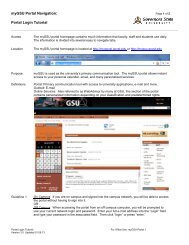Master of Occupational Therapy Program - Governors State University
Master of Occupational Therapy Program - Governors State University
Master of Occupational Therapy Program - Governors State University
Create successful ePaper yourself
Turn your PDF publications into a flip-book with our unique Google optimized e-Paper software.
F. Provide services that reflect an understanding <strong>of</strong> how occupational therapy service<br />
delivery can be affected by factors such as economic status, age, ethnicity, race,<br />
geography, disability, marital status, sexual orientation, gender, gender identity, religion,<br />
culture, and political affiliation.<br />
G. Consider <strong>of</strong>fering pro bono (“for the good”) or reduced-fee occupational therapy services<br />
for selected individuals when consistent with guidelines <strong>of</strong> the employer, third-party<br />
payer, and/or government agency.<br />
PROCEDURAL JUSTICE<br />
Principle 5. <strong>Occupational</strong> therapy personnel shall comply with institutional rules, local,<br />
state, federal, and international laws and AOTA documents applicable to the pr<strong>of</strong>ession <strong>of</strong><br />
occupational therapy.<br />
Procedural justice is concerned with making and implementing decisions according to fair<br />
processes that ensure “fair treatment” (Maiese, 2004). Rules must be impartially followed and<br />
consistently applied to generate an unbiased decision. The principle <strong>of</strong> procedural justice is based<br />
on the concept that procedures and processes are organized in a fair manner and that policies,<br />
regulations, and laws are followed. While the law and ethics are not synonymous terms,<br />
occupational therapy personnel have an ethical responsibility to uphold current reimbursement<br />
regulations and state/territorial laws governing the pr<strong>of</strong>ession. In addition, occupational therapy<br />
personnel are ethically bound to be aware <strong>of</strong> organizational policies and practice guidelines set<br />
forth by regulatory agencies established to protect recipients <strong>of</strong> service, research participants, and<br />
the public.<br />
<strong>Occupational</strong> therapy personnel shall<br />
A. Be familiar with and apply the Code and Ethics Standards to the work setting, and share<br />
them with employers, other employees, colleagues, students, and researchers.<br />
B. Be familiar with and seek to understand and abide by institutional rules, and when those<br />
rules conflict with ethical practice, take steps to resolve the conflict.<br />
C. Be familiar with revisions in those laws and AOTA policies that apply to the pr<strong>of</strong>ession<br />
<strong>of</strong> occupational therapy and inform employers, employees, colleagues, students, and<br />
researchers <strong>of</strong> those changes.<br />
D. Be familiar with established policies and procedures for handling concerns about the<br />
Code and Ethics Standards, including familiarity with national, state, local, district, and<br />
territorial procedures for handling ethics complaints as well as policies and procedures<br />
created by AOTA and certification, licensing, and regulatory agencies.<br />
E. Hold appropriate national, state, or other requisite credentials for the occupational<br />
therapy services they provide.<br />
F. Take responsibility for maintaining high standards and continuing competence in<br />
practice, education, and research by participating in pr<strong>of</strong>essional development and<br />
educational activities to improve and update knowledge and skills.<br />
G. Ensure that all duties assumed by or assigned to other occupational therapy personnel<br />
match credentials, qualifications, experience, and scope <strong>of</strong> practice.<br />
H. Provide appropriate supervision to individuals for whom they have supervisory<br />
responsibility in accordance with AOTA <strong>of</strong>ficial documents and local, state, and federal<br />
or national laws, rules, regulations, policies, procedures, standards, and guidelines.<br />
7





